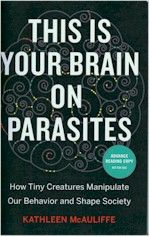 |
|
|
| ||||||
|
|
This page is the original source of this review, though you may also find it on Amazon or other sites. | ||
| Book Reviews Home | Free Audio Books | |
 |
Book Review of: This Is Your Brain On ParasitesHow Tiny Creatures Manipulate Our Behavior and Shape Society Price: About $20 for the hardcover version Availability: Usually ships within 24 hours |
| Review of
This Is Your Brain On Parasites, by Author (Softcover, 2016) (You can print this review in landscape mode, if you want a hardcopy) Reviewer: Mark Lamendola, author of over 6,000 articles. I found this a most intriguing read. The author's basic premise is it's very likely that parasites (among other creatures, whose relationship to is isn't parasitic) influence the behavior of individual human beings. And sometimes on a collective or group scale. She provides a well-researched large body of evidence showing strong correlations. Not only is the subject new (to me) and interesting, this author bucked the current trend and wrote it in correct English. Perhaps most importantly, she had an honest approach instead of the more typical proselytizing one. Too many authors these days believe they must debate when they write a book, instead of either laying out the facts with appropriate caveats or covering both sides (if the subject is controversial). The premise has had a difficult time gaining traction. For one thing, people (including researchers) tend to avoid it due to the disgust factor. The author discusses disgust at some length, even providing material gleaned from people who call themselves disgustologists. The thought, for example, of worms burrowing into human brains (or, really, anything) evokes a very strong sense of disgust in us. Think of the response if you brought it up on conversation. So, how are those Mets doing? As a reviewer, I realize many people will want to dismiss this idea out of hand. Especially if they enjoy the Western culture where the idea of individual choice has been so widely promoted and accepted. But really, do we exercise individual choice? Not even close. Look at how many people are addicted to something or who make self-damaging food choices because they let "marketing messages" from television over-ride their ability to make smart food choices. Or look at the fake "elections" we have for President. Less than 3% of voters make a real choice; the rest let the choice be made for them and we know this because they play the "lesser of two evils" non-choice game instead of using their vote as a real choice. On and on it goes. So it is not far-fetched, in our robotic-eating and robotic-voting culture, to set aside the idea that we are self-actualized beings making our own choices. In light of the actual evidence, it's far-fetched to assume we are. Humans are, in fact, fairly easy to control (as the two previous examples illustrate). The author didn't point this out, I'm pointing it out for those who reject the idea of mind control. It's not really just an idea, but a way of life (as, again, those two examples illustrate). Enter the microbes. Every time you enter a room you enter with microbes. So many that, in fact, they make up the majority of what you consider to be you. It almost does not make sense that they would be without a say in what goes on with your mind and body. Control? More like an influence, not some sort of control that's absolute. The author repeatedly returns the reader to this perspective. In one place in the book, she panned the idea of a legal defense, "My microbes made me do it" as a "not gonna happen" thing. In animal experiments and field observations, however, researchers have found evidence of extensive control by the parasite of the host. This gives us a reason to pause and think about the implications for humans. And it's the author's discussion of these implications that makes this book so fascinating. This book is not a call to arms for us mind-controlled humans to rise up against our microbe oppressors and smite them with antibacterial soap, mouthwashes, and anything else we can use to kill them off. To the contrary, the author correctly asserts that we have a symbiotic relationship with bacteria (and other small critters). She discusses, for example, the use of probiotics (not the poor quality products sold in bottles as supplements) to correct imbalances. The day after I read her discussion of this, I was grocery shopping so picked up some organic yogurt. Americans use a prodigious amount of "personal care" products to combat bad breath and body odor, but this is the wrong approach. Remember what I said earlier about robotic-eating? That's the cause of the bad breath and body odor (except in rare cases). Using mouthwash only further throws the fauna out of balance. We really don't know the true role(s) of microbes in our bodies yet, but attacking them with broad spectrum chemicals is a bad idea. One benefit of this book, even if you end up disagreeing with the author's basic premise, is she provides plenty of well-researched material that will help the typical reader much better understand such things as why frequently using antibacterial soap is probably hurting you. Basic hygiene, yes. Going to war against germs, no. This book consists of 219 well-written pages, including the Introduction and twelve chapters. I realize I've already repeated myself in saying this book is well-researched, but I want to point out that it has not 10, not 15, but 25 pages of backnotes. Just looking through the sources tells you this author really cared about getting her facts right. Many of these are professional journals. She also quotes Science Magazine, a well-respected publication. She conducted several interviews, also. | |
| |||||